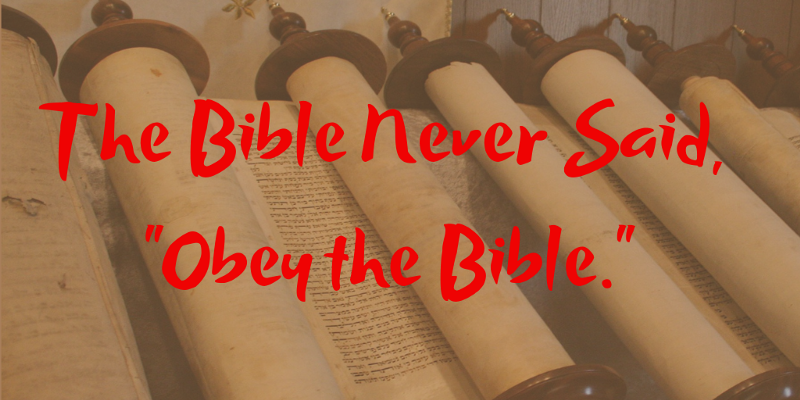Would you buy alien invasion insurance?
A recent Gallup poll revealed that a significant percentage of Americans believe that aliens have visited the earth. Even so, I bet alien invasion insurance would be a tough sell especially if the premiums were very high.
Two factors mitigate its appeal.
- Nobody’s ever experienced one. Aliens might be real and if they have visited this planet from a distant star system, they’re surely advanced enough to win an interstellar conflict. But, we’ve never even had a skirmish with them. People pay insurance premiums for “peace of mind” over events that cause them concern. I’ve never met anyone who lies awake at night wondering how they will rebuild should a photon cannon level their home.
- By the time benefits become payable, it’ll be too late for a refund. Suppose they come and take over. Who’s going to enforce the payout?
The gospel is a hard sell for the same reason alien invasion insurance is.

People are understandably unwilling to prepare for a world yet to come. Nobody’s ever experienced a divine judgment. Sure, everyone is going to die, but the promise of eternal bliss afterward to those who pay some sort of earthly price is impossible to verify. To my knowledge the dead haven’t started leaving ratings and reviews.
The call to “save yourselves from the coming wrath,” sounded more credible in premodern times. A pandemic announced God’s wrath rather than viral mutation. Volcanic vents threatened eternal suffering in a subterranean realm of the dead rather than geothermal activity. Nowadays the appeal to “get saved,” is met with, “From what?”
Additionally, the gospel requires a high premium. The New Testament presents Jesus as demanding that we give up our relationships, possessions, and rights to ourselves in order to have it. In other words, “Give up everything to prepare for something no one’s ever experienced and for which there can be no real guarantee.” Not a great sales pitch.
These weaknesses of gospel presentation in the modern age not only alienate unbelievers; they result in flaccid faith among church goers as well. A person might be a Christian in twenty-first century America because they were raised in the faith, because they like the community, because they gravitate to moral absolutes, or because they need support in raising their kids. I think this is why large churches that offer lots of spiritual goods and services tend to be more successful in America. It’s probably also why those same churches struggle to recruit volunteers or get their members to give more than 3% of their income.
Jesus asked, “What will a person give in exchange for their life?” The obvious answer is, “Everything.” But for most American church goers, the gospel isn’t a matter of life and death. It’s good versus best and most people won’t make huge sacrifices to just feel a bit better about themselves or their futures.
Seeker spirituality might fill church buildings or even stadiums but it’s fatally flawed in the following way:
- You can’t be a disciple of Christ without surrendering everything.
- People only surrender everything for self preservation.
- A “gospel” which doesn’t address perdition, can’t produce disciples.
So, we’re left with a dilemma. The traditional appeal to get saved no longer resonates with the modern mind. The modified offer of personal wholeness, while striking a chord with overwrought moderns, doesn’t produce Christians.
The gospel offers perennial salvation.
The answer to the dilemma I’ve presented can be found not in apologetic gymnastics or creative contextualization. It’s, of all places, right in the New Testament. Here it is:
Grace and peace to you from God our Father and the Lord Jesus Christ, who gave himself for our sins to rescue us from the present evil age, according to the will of our God and Father, to whom be glory for ever and ever. Amen.
Galatians 1:3-5 NIV
The Lord Jesus Christ gave himself for our sins to rescue us from something in the present!
No, you wouldn’t buy alien invasion insurance, but what if they had already invaded and had installed a governor in our brains. What if someone came around offering to remove the governor and in doing so, liberate everyone from external control? What if you ran into a group of people who were free in a way that nobody else was and they claimed to have undergone the procedure?
What would you do to get the real you back?
If Paul offered salvation to someone and they asked, “Saved from what?” he wouldn’t have just said, “an eternity in hell,” or whatever other revivalist threats we might think of. He would say, “From this present evil age.” He wouldn’t be the only one, either.
Look at the first-ever “altar call”:
“Therefore let all Israel be assured of this: God has made this Jesus, whom you crucified, both Lord and Messiah.”
When the people heard this, they were cut to the heart and said to Peter and the other apostles, “Brothers, what shall we do?”
Peter replied, “Repent and be baptized, every one of you, in the name of Jesus Christ for the forgiveness of your sins. And you will receive the gift of the Holy Spirit. The promise is for you and your children and for all who are far off—for all whom the Lord our God will call.”
With many other words he warned them; and he pleaded with them, “Save yourselves from this corrupt generation.” Those who accepted his message were baptized, and about three thousand were added to their number that day.
Acts 2:36-41 NIV (Emphasis mine)
Christ died to save us from the conforming, controlling, corrupting influence of the society into which we’ve been born. He wants to snatch the real us that he created from the pollution, dilution, and distortion imposed upon us by the flood of manipulation and intimidation that barrages us every minute of every hour of every day.
Remember how Paul cut all association between his apostleship and human influence back in verse 1? This is why! He preached a gospel of radical freedom which couldn’t be beholden to human authority or cultural conformity.
Stuck in the middle…at the start
Maybe you already think you’re free. You’re not.
We’re wired to obey authority and conform to our culture. Even if we defy one of these controlling influences we end up in the clutches of the other one. A teenager might defy her parents, but spiral into depression over perceived rejection on social media. Someone who struggles socially might gravitate towards the predefined hierarchy of the military or a career in law enforcement.
That probably doesn’t feel like much of a problem in a civil society, but slavery is still slavery no matter how familiar the chains or how tolerable the tasks.
I remember having a group of formerly religious people over to my house to watch The Experimenter, a movie about Dr. Stanley Milgram’s obedience experiments. After watching a depiction otherwise “good” people administer what they believed were lethal shocks to a stranger at the urging of a perceived authority, one young woman said, “I’d like to think I wouldn’t have done that, but I probably would.” I appreciated her honesty. We all think we’re free as long as we’re comfortable with society’s demands. As soon as those demands change, we discover how beholden we’ve been all along.
More recently, think about the power of cancel culture to force an apology from almost everyone. It’s hard for me to believe that so many people say things in the first place which completely defy their essential values. Or that their real opinions only come out in the face of social censure. Jesus according to the Gospel of Matthew declared that people say what’s in their heart. I tend to believe Christ over a whole procession of backpedaling celebrities.
No only is everyone influenced by authority and conformity, the two of them together conspire to control almost every aspect of our behavior. The law might say that you can’t leave the house naked, but it’s your culture that dictates which clothes you’ll put on. Authority and conformity form a social Scylla and Charybdis through which no one can pass to true freedom. It’s as the classic Demotivator observed, “When people are free to do as they please, they usually imitate each other.”
At the same time, we must be free.
Bound to be free
Only a free person can be said to be authentic and only an authentic person can be truly moral. Moralistic rants on social media might make you feel like a justice warrior, but they say less about your real priorities than they do your cultural programming. Virtue signaling isn’t the same thing as being virtuous. Neither does a clean criminal record indicate a pure heart. I’ve seen ex-cons painstakingly toe the legal line while exploiting every kindness they could elicit. Authority atrophies character. Conformity counterfeits it. Only outside the reach of either can it truly develop or be expressed.
If we can’t get free but we must be free, what are we to do?
We need to be saved!
In the latter phrase of Galatians 1:3, Paul refers to Christ by this lengthier moniker, “Lord Jesus Christ.” This is the first explicit mention of his identity as God-king. The confession that “Jesus is Lord” was in one moment an oath of fealty and a declaration of independence. In its deference it defies cultural norms and political authority at the same time. The good confession in first century Rome made a person an outcast among majority believers in Yahweh by ascribing to a man that which first century Jews reserved for God. It simultaneously diverted the secular allegiance which the Romans required for Caesar, to a celestial deity.
Where could someone find the personal and spiritual fortitude to defy both Jewish and Roman society? It had to be through a conviction that Jesus Christ really had received “all authority in heaven and on earth.”
This might not sound like liberation. Just this week, I heard about someone who’d abandoned the faith because being “purchased by blood” just transferred ownership over us from sin to Christ. I don’t know this person and I’m sure they’re otherwise quite intelligent, but that line of reasoning is bafflingly naïve. Even if a society could scrub every vestige of hierarchical control, cultural conformity would expand into the vacuum. In essence every person would trade one governing authority for millions. Only an ultimate, ever-present authority could give individuals the wherewithal to defy the insidious totalitarian reign of public opinion.

Even in a supposed free society most people want there to be some sort of authority to at least control their neighbors. Civilization depends on authority structures. Social experiments which attempt to do away with them inevitably create new ones.
We will be under authority and we must be free. How?
By willingly offering our allegiance to someone who commands that we live free.
But what would inspire someone to gladly give away their pretense of self determination? And what ruler having received such compliance would use it to make self determination mandatory? The answer to both questions can be found in the next phrase of Paul’s introduction, “who gave himself for our sins…” Christ has purchased our obligation with his blood, but he’s also bought our gratitude. At least that’s how Paul responded:
The life I now live in the body, I live by faith in the Son of God, who loved me and gave himself for me.
Galatians 2:20b NIV
There’s no hint of begrudging drudgery in this declaration. Paul had entered love’s natural transaction with Christ: “He lovingly gave himself for me, so I will give myself to him.”
Beyond the heart’s inclination to love in return, Paul’s decision to give himself to Jesus made rational sense. Surely someone who willingly died for him wouldn’t betray him or mislead him.
Notice also that he gave himself for our sins. It doesn’t say that he gave himself for our strong backs. This wasn’t the purchase of free labor, but liberation from fruitless toil (aka “sin”). According to Romans 3:23, to sin is to fall short of the glory of God. Assuming that by “glory” Paul meant the image of God in which we were made, then Christ’s dying for our sins must be intended to restore that glory. His dying for our sins liberated us to become our truest selves.
We were purchased by the blood to serve in God’s household, but not as slaves. Rather we’ve been redeemed from all slavery to live as God’s children which is what we were created to be. Not only is slavery no longer our lot, it’s not even an option. How could those who’ve been redeemed by the blood of God’s Son ever think of themselves as bound to anything?
Trust Big Brother
Imagine you’ve been adopted as royalty (which you have). You are now the top dog and nobody gets to tell you what to do. You own everything and anything you might want is yours for the asking. How would you make decisions without external limits?
I think many (sadly) especially religious people recoil at the idea of complete freedom under Christ because they’re still clinging to the old social structures. We’re born into a world of crime and punishment. We know that while it might not produce authentic personal renewal, it at least keeps people contributing and on the rails. That’s enough for even most church leaders, but it’s not enough for God.
Did you know that you can build a church without a shred of real faith in God? It’s been done. An examination of the life of Joseph Smith or that of Charles Russell reveal utter charlatans founding world religions. How did they do it? They and their successors mastered earthly control structures. If you attend a Mormon ward this Sunday, you’ll notice a couple of things. First, everyone will be dressed the same – conformity. Second, you’ll notice that much is said about the authority of the church and its leaders, but almost nothing about God’s will – human authority. If after you get out of that meeting you bop over to a Kingdom Hall, you’ll notice everyone calling God by the same, unique-to-that-movement name, “Jehovah” – conformity. You’ll also notice that nobody in the room is a leader per se so much as a reader, of Watchtower publications – human authority. I’m sure there are many well-meaning Mormons and JW’s, but nothing positive about those groups necessarily glorifies God. Every single benevolent work or evangelistic activity can easily be attributed to ordinary social dynamics applied in a religious setting.
The lesson to evangelical churches, then, should be, “If you’re getting church done through authoritarian directives or group dynamics, you’re not doing the work of God.” It takes a certain special quality to trust that people will be transformed and God’s work will get done apart from social control. That quality is called, “faith.” Anything we do that doesn’t arise from it is sin. And nothing we do apart from it will ever please God.
In our own lives and in the lives of those around us, we must trust that those whom God has adopted have also received the Spirit of his Son. This means, they have the essence of his character and will express it in ways unique to each one. What is the essence of the Son? Complete trust in and love for the Father.
The same willing submission which we offer to Christ, he offered first to the Father.
Look again at Galatians 1:4, “who gave himself for our sins to rescue us from the present evil age, according to the will of our God and Father…” (emphasis mine).
Christ set us free from the broken control structures of this world by utterly defying them. Rather than leveraging his strengths to serve his ambition, he surrendered to ignominy and oblivion. Through it all, he remained free and unbowed before religious and political leaders. Having been vindicated, he confers his same brand of faith on everyone who accepts the benefits of his sacrifice. From that moment on, we are adopted and adopt his greatest desire – that to God, the Father would be glory both now and forever! (vs. 5)




